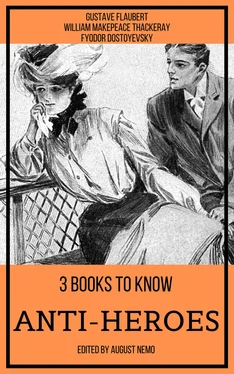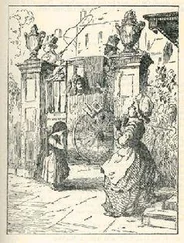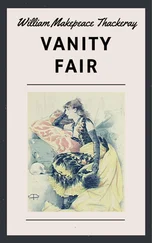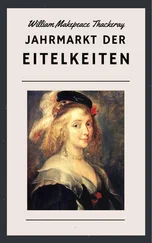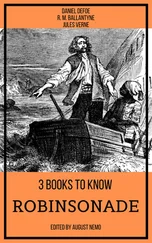‘Villain!’ cried my Lady Lyndon, ‘could you dare to construe out of those idle letters of mine any other meaning than that which they really bear?’
‘I will construe anything out of them,’ said I; ‘such is the passion which animates me towards you. I have sworn it—you must and shall be mine! Did you ever know me promise to accomplish a thing and fail? Which will you prefer to have from me—a love such as woman never knew from man before, or a hatred to which there exists no parallel?’
‘A woman of my rank, sir, can fear nothing from the hatred of an adventurer like yourself,’ replied the lady, drawing up stately.
‘Look at your Poynings—was HE of your rank? You are the cause of that young man’s wound, madam; and, but that the instrument of your savage cruelty relented, would have been the author of his murder—yes, of his murder; for, if a wife is faithless, does not she arm the husband who punishes the seducer! And I look upon you, Honoria Lyndon, as my wife.’
‘Husband? wife, sir!’ cried the widow, quite astonished.
‘Yes, wife! husband! I am not one of those poor souls with whom coquettes can play, and who may afterwards throw them aside. You would forget what passed between us at Spa: Calista would forget Eugenio; but I will not let you forget me. You thought to trifle with my heart, did you? When once moved, Honoria, it is moved for ever. I love you—love as passionately now as I did when my passion was hopeless; and, now that I can win you, do you think I will forego you? Cruel cruel Calista! you little know the power of your own charms if you think their effect is so easily obliterated—you little know the constancy of this pure and noble heart if you think that, having once loved, it can ever cease to adore you. No! I swear by your cruelty that I will revenge it; by your wonderful beauty that I will win it, and be worthy to win it. Lovely, fascinating, fickle, cruel woman! you shall be mine—I swear it! Your wealth may be great; but am I not of a generous nature enough to use it worthily? Your rank is lofty; but not so lofty as my ambition. You threw yourself away once on a cold and spiritless debauchee: give yourself now, Honoria, to a MAN; and one who, however lofty your rank may be, will enhance it and become it!’
As I poured words to this effect out on the astonished widow, I stood over her, and fascinated her with the glance of my eye; saw her turn red and pale with fear and wonder; saw that my praise of her charms and the exposition of my passion were not unwelcome to her, and witnessed with triumphant composure the mastery I was gaining over her. Terror, be sure of that, is not a bad ingredient of love. A man who wills fiercely to win the heart of a weak and vapourish woman MUST succeed, if he have opportunity enough.
‘Terrible man!’ said Lady Lyndon, shrinking from me as soon as I had done speaking (indeed, I was at a loss for words, and thinking of another speech to make to her)—‘terrible man! leave me.’
I saw that I had made an impression on her, from those very words. ‘If she lets me into the house to-morrow,’ said I, ‘she is mine.’
As I went downstairs I put ten guineas into the hand of the hall-porter, who looked quite astonished at such a gift.
‘It is to repay you for the trouble of opening the door to me,’ said I; ‘you will have to do so often.’
CHAPTER XVI. I PROVIDE NOBLY FOR MY FAMILY
––––––––

THE NEXT DAY WHEN I went back, my fears were realised: the door was refused to me—my Lady was not at home. This I knew to be false: I had watched the door the whole morning from a lodging I took at a house opposite.
‘Your lady is not out,’ said I: ‘she has denied me, and I can’t, of course, force my way to her. But listen: you are an Englishman?’ ‘That I am,’ said the fellow, with an air of the utmost superiority. ‘Your honour could tell that by my HACCENT.’
I knew he was, and might therefore offer him a bribe. An Irish family servant in rags, and though his wages were never paid him, would probably fling the money in your face.
‘Listen, then,’ said I. ‘Your lady’s letters pass through your hands, don’t they? A crown for every one that you bring me to read. There is a whisky-shop in the next street; bring them there when you go to drink, and call for me by the name of Dermot.’
‘I recollect your honour at SPAR,’ says the fellow, grinning: ‘seven’s the main, hey?’ and being exceedingly proud of this reminiscence, I bade my inferior adieu.
I do not defend this practice of letter-opening in private life, except in cases of the most urgent necessity: when we must follow the examples of our betters, the statesmen of all Europe, and, for the sake of a great good, infringe a little matter of ceremony. My Lady Lyndon’s letters were none the worse for being opened, and a great deal the better; the knowledge obtained from the perusal of some of her multifarious epistles enabling me to become intimate with her character in a hundred ways, and obtain a power over her by which I was not slow to profit. By the aid of the letters and of my English friend, whom I always regaled with the best of liquor, and satisfied with presents of money still more agreeable (I used to put on a livery in order to meet him, and a red wig, in which it was impossible to know the dashing and elegant Redmond Barry), I got such an insight into the widow’s movements as astonished her. I knew beforehand to what public places she would go; they were, on account of her widowhood, but few: and wherever she appeared, at church or in the park, I was always ready to offer her her book, or to canter on horseback by the side of her chariot.
Many of her Ladyship’s letters were the most whimsical rodomontades that ever blue-stocking penned. She was a woman who took up and threw off a greater number of dear friends than any one I ever knew. To some of these female darlings she began presently to write about my unworthy self, and it was with a sentiment of extreme satisfaction I found at length that the widow was growing dreadfully afraid of me; calling me her bete noire, her dark spirit, her murderous adorer, and a thousand other names indicative of her extreme disquietude and terror. It was: ‘The wretch has been dogging my chariot through the park,’ or, ‘my fate pursued me at church,’ and ‘my inevitable adorer handed me out of my chair at the mercer’s,’ or what not. My wish was to increase this sentiment of awe in her bosom, and to make her believe that I was a person from whom escape was impossible.
To this end I bribed a fortune-teller, whom she consulted along with a number of the most foolish and distinguished people of Dublin, in those days; and who, although she went dressed like one of her waiting-women, did not fail to recognise her real rank, and to describe as her future husband her persevering adorer Redmond Barry, Esquire. This incident disturbed her very much. She wrote about it in terms of great wonder and terror to her female correspondents. ‘Can this monster,’ she wrote, ‘indeed do as he boasts, and bend even Fate to his will?—can he make me marry him though I cordially detest him, and bring me a slave to his feet. The horrid look of his black serpent-like eyes fascinates and frightens me: it seems to follow me everywhere, and even when I close my own eyes, the dreadful gaze penetrates the lids, and is still upon me.’
When a woman begins to talk of a man in this way, he is an ass who does not win her; and, for my part, I used to follow her about, and put myself in an attitude opposite her, ‘and fascinate her with my glance,’ as she said, most assiduously. Lord George Poynings, her former admirer, was meanwhile keeping his room with his wound, and seemed determined to give up all claims to her favour; for he denied her admittance when she called, sent no answer to her multiplied correspondence, and contented himself by saying generally, that the surgeon had forbidden him to receive visitors or to answer letters. Thus, while he went into the background, I came forward, and took good care that no other rivals should present themselves with any chance of success; for, as soon as I heard of one, I had a quarrel fastened on him, and, in this way, pinked two more, besides my first victim Lord George. I always took another pretext for quarrelling with them than the real one of attention to Lady Lyndon, so that no scandal or hurt to her Ladyship’s feelings might arise in consequence; but she very well knew what was the meaning of these duels; and the young fellows of Dublin, too, by laying two and two together, began to perceive that there was a certain dragon in watch for the wealthy heiress, and that the dragon must be subdued first before they could get at the lady. I warrant that, after the first three, not many champions were found to address the lady; and have often laughed (in my sleeve) to see many of the young Dublin beaux riding by the side of her carriage scamper off as soon as my bay-mare and green liveries made their appearance.
Читать дальше
